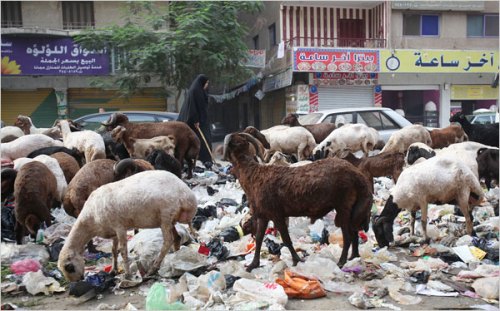Yesterday, Amm Abdu left a little scrap of paper on my desk telling me that, in the twenty minutes I had stepped out to buy vegetables, bread, and Coke, the deliveryman decided to see if I was home. Sometimes, I think he lurks outside and waits for me to leave makes before he makes his deliveries.
This usually means a ten minute walk to Sidi Gaber Station, where a quick trip through the backdoor of the post office puts me in touch with Sayyid, the local bosta that handles letters. He occasionally stops me in the cafe and asks me to read the addresses of a few things with Roman letters and no Arabic writing. Occasionally he lets me get away with not paying for packages that should have been paid for. Unfortunately, though, this elusive parcel I was currently after never even made it that far: one of Sayyid’s compatriots let me know that I had to go down to the main office in Ma7attat Masr, on the edge of Mo7arrem Beym in order to get it. I caught a cab on Abu Qir and, with a sigh, I was on my way.
Ma7attat Masr is one of those places that is so wonderfully and terrible Egypt in and of itself. It’s extremely colorful — the main train station that links the City of Memory in iron with the capital has a marvelous brick-and-marble facade, and the surrounding buildings, though decaying, still have shadows of their former grandeur about them (I’m particularly fond of the neo-Gothic arcade on top of the building opposite the Mo7arrem Bey “Centraal”). Here was once the edge of Durrell’s “garden city” with wide lanes and carriage-houses, Italianate villas and fountains. You could sit in the central gardens and be shaved by baladi barbers in the open morning air next to mumuring fountains. I’m rhapsodizing, yes, but up until thirty years ago, the open-air shave was still pretty common.
Nowadays, the square in front of the station is one hell of a headache — it seems that every street in the city intersects through this section of the city, and the place has one of the strongest smells I’ve ever encountered: gutter-garbage, urine, rotting vegetables, and occasionally something worse are relieved only every now and then by a mercifully misguided breeze or a wandering mabkhaar, who swings his charcoal-and-frankincense censer through your shop for a quick quid. It’s bizarre to suddenly encounter the clean smell I associate with darker Catholic churches in the smoky bright light of the square, surrounded by traffic and noise.
Asking for directions is always tricky. The best way I’ve found is like taking an opinion poll. Ask one shop, then ask another, and if they agree, head in that direction. If they don’t, keep asking. Keep asking when you head in the direction they pointed. Too many people don’t know where anything is and end up saying, “That way, straight ahead, God willing.” Thanks, but not helpful.
I find the post office eventually, and go inside; the place is huge and a big mess. Dizzy high ceilings, scraps of paper everywhere. New glass partitions between offices, but general chaos. Apparently (as I gathered from the people on the third floor) this is where they open your packages for inspection, seal them back up, and send them onward. This is also probably where half of the chocolate Katie’s boyfriend sent her got eaten by customs officials.
I sit in a broken old cafe chair that’s offered to me, hand my paper to a clerk and look around; broken desks and lots of ripped boxes, improvised seat cushions. Dust-covered, fake plastic vines decorated the walls — which was kind of odd and disconcerting (it was like someone was trying to “decorate” a factory). Every workstation had a collection of chipped glasses and a water boiler — old soda bottles filled with tap water, a box of powder tea, a jar of sugar.
Suddenly, I realize that nearly all the employees were women. Not only that, but the place was filled with kids — some of them had apparently brought their children with them to work, and they were running around the place kicking an enormous ball of used tape like a soccer ball.
After waiting for five minutes, I’m informed that if I had turned the piece of paper over, the delivery man had written his name (illegible) and his cell phone number (also illegible) to call. This, apparently, is how it’s done: call him up and he’ll deliver it to the door. No need to come all the way down to the main office. But he’s on his way here, no problem; he’ll bring the package here. Give him ten minutes.
Ah.
Ten people must have seen that piece of paper. I’m assuming they thought the same thing that I did: that the scrawl on the back didn’t say “Ahmed, call me when you want the package,” but was rather someone trying out a new pen.
When Ahmed the deliveryman arrived, he opened the package, examined the inside, and charged me LE 30. He also asked what something was in the package.
“Pepperoni,” I beamed.
What’s that? he responded.
“A kind of pork,” I said.
He threw it back in the package, taped it up, and shoved the package in my hands. He said not to worry about the 30 LE.
I carried the box out of the office triumphantly.


